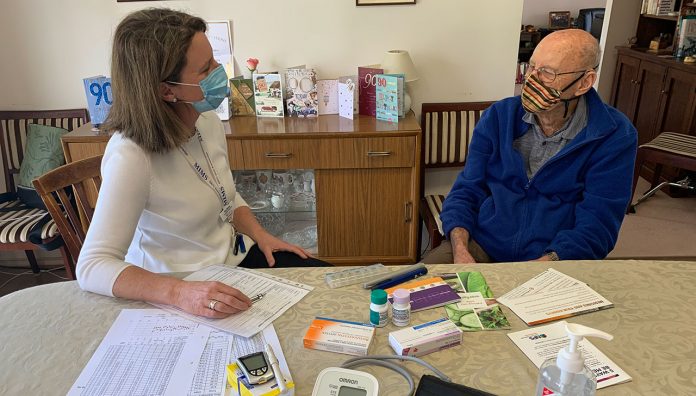With the Australian Association of Consultant Pharmacy (AACP) closing its doors at the end of the year, PSA is stepping up to become the new home of accreditation.
Pharmacists will soon be able to undertake accreditation through PSA, which is working to streamline processes and remove barriers, ensuring accreditation is accessible to all interested pharmacists.
Accreditation will continue to be an essential component of the pharmacy profession, particularly as work progresses to have on-site pharmacists in residential aged care facilities, said PSA National President Dr Fei Sim.
‘The PSA is and always will be the home of accredited pharmacists. Accreditation aligns with our policy and advocacy agenda,’ she said.
‘We are absolutely committed to ensuring accreditation opportunities remain, and acknowledge the need for pharmacists to develop and maintain the skills attained during accreditation to be a minimum requirement for activities [such as] Residential Medication Management Reviews and Home Medicines Reviews.’
A strategic transition
The decision to close the AACP was made after an agreement was reached with its owners, PSA and the Pharmacy Guild of Australia (PGA), with its functions to transition to both owners.
From 2023, PSA and the PGA, via the Australasian College of Pharmacy (ACP), will both provide accreditation programs.
It is hoped the new accreditation models will help to maintain and boost the accredited pharmacist workforce and provide additional support for pharmacists to navigate an ever-changing professional landscape.
‘The PSA is and always will be the home of accredited pharmacists.’
Dr Fei Sim
Despite the impending changes, accredited pharmacists and those undergoing accreditation can rest assured that disruptions will be minimal, said both PSA and ACP in a joint statement.
All current AACP accreditations will remain valid, and the AACP will continue to assess candidates for accreditation until its closure at the end of 2022. Those slated to complete their accreditation before early 2023 can continue through the AACP.
Pharmacists now in Stage 2 of the accreditation process can choose to complete the program through PSA or ACP from next year.
‘We encourage all pharmacists who are undergoing accreditation to continue their accreditation process with the AACP, with further guidance available from the AACP about transition arrangements in the coming weeks,’ the statement said.
Pharmacists who opt to undertake accreditation or reaccreditation with PSA will be offered post-nominal MPS-AACPA, along with opportunities to attend exclusive events for accredited pharmacists.
Professional support and development will also be extended to accredited pharmacists throughout their career, not just while undergoing training.
‘This is an important part of the support AACP has provided, and PSA is proud to carry on that legacy,’ Dr Sim added.
PSA’s new approach to accreditation
To ensure the new model is the best it can be, a team of accreditation specialists has been assembled to form the PSA Accreditation Expert Advisory Group (EAG), led by Chair Debbie Rigby FPS who has been involved with the AACP since its inception in 1997.
The EAG, which also comprises Associate Professor Chris Freeman FPS (QLD), Deborah Hawthorne MPS (VIC), Dr Andrew Stafford MPS (WA), Dr Manya Angley FPS (SA), and Tim Perry FPS (NSW), is working to ensure accredited pharmacists’ needs are met.
‘Accreditation is an important step to assure consumers, aged care providers, GPs and funders that pharmacists are competent to conduct comprehensive medication reviews,’ Ms Rigby said.
With that in mind, the EAG explored ways to contemporise the training and assessment process, building on the existing AACP model by considering evolving practice needs and external feedback.
‘The EAG proposed a model with distinct separation of training and assessment, rather than training through assessment,’ Ms Rigby told Australian Pharmacist.
‘A Foundation Medication Management Review (MMR) Module will integrate components of existing training plus additional elements to address the competencies required for best MMR services.’
The EAG also recommended a redesign of the assessment process to include both written and verbal components for efficiency purposes.
‘This will create an opportunity to fast-track accreditation for those already experienced in medication optimisation,’ she said.
A suite of training and education modules as well as support and mentoring are similarly in the works.
‘Opportunities for different career pathways for pharmacists continue to expand, so it’s important that we have a complete package of support, training and credentialling for pharmacists attracted to this area of practice,’ she said. ‘A fit-for-purpose discussion platform is a high priority.’
At this stage, Ms Rigby said the proposed PSA accreditation pathway is yet to be finalised, with discussions underway with the Department of Health and Aged Care around changes to the program rules.
However, with implementation of the On-site Aged Care Pharmacist program to commence next year, growing awareness of the benefits of pharmacists in general practice, and the need for pharmacists in disability care, there are endless opportunities for accreditation.
‘For pharmacists interested in team-based medication management and advanced clinical care, I’d encourage you to undergo accreditation,’ Ms Rigby said. ‘For existing accredited pharmacists, look forward to enhanced CPD and support through PSA.’



 John Jones MPS, pharmacist immuniser and owner of My Community Pharmacy Shortland in Newcastle, NSW[/caption]
John Jones MPS, pharmacist immuniser and owner of My Community Pharmacy Shortland in Newcastle, NSW[/caption]


 Debbie Rigby FPS explaining how to correctly use different inhaler devices[/caption]
Debbie Rigby FPS explaining how to correctly use different inhaler devices[/caption]




 Professor Sepehr Shakib[/caption]
Professor Sepehr Shakib[/caption]

 Lee McLennan MPS[/caption]
Lee McLennan MPS[/caption]
 Dr Natalie Soulsby FPS, Adv Prac Pharm[/caption]
Dr Natalie Soulsby FPS, Adv Prac Pharm[/caption]
 Joanne Gross MPS[/caption]
Joanne Gross MPS[/caption]





